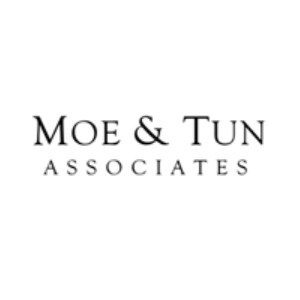Best Funds & Asset Management Lawyers in Yangon
Share your needs with us, get contacted by law firms.
Free. Takes 2 min.
List of the best lawyers in Yangon, Myanmar
About Funds & Asset Management Law in Yangon, Myanmar
Funds and asset management is an important sector in Yangon, Myanmar, as the country’s economy continues to modernize and attract both local and foreign investment. This field pertains to the professional management of various collective investment schemes, such as mutual funds, investment trusts, and private wealth portfolios. The regulatory landscape in Myanmar is still developing, and the government has introduced new laws and guidelines to govern how funds are set up, managed, and supervised. The Securities and Exchange Commission of Myanmar (SECM) is the primary authority overseeing this sector, aiming to protect investors and ensure transparency in financial operations.
Why You May Need a Lawyer
Hiring a lawyer who specializes in funds and asset management can be crucial for several reasons. Investors and asset managers often need assistance with navigating new and evolving regulations, ensuring their investment vehicles are properly licensed, and drafting or reviewing contracts. Legal teams can support due diligence processes, advise on compliance with anti-money laundering laws, and help resolve disputes. Lawyers are also indispensable when it comes to setting up new funds, acquiring local regulatory approvals, and handling cross-border investment issues that may arise.
Local Laws Overview
The legal framework for funds and asset management in Yangon is largely shaped by the Securities Exchange Law (2013) and subsequent regulations issued by the SECM. The cornerstone of regulation is investor protection, market stability, and the promotion of transparent investment practices. Operators in this sector must obtain licenses to offer fund management services. Additionally, strict reporting and disclosure requirements are in place to ensure that both individual and institutional investors remain informed about their investments. Myanmar’s laws also require asset management companies to adhere to anti-money laundering guidelines and to follow best practices in good governance.
Frequently Asked Questions
What is a fund manager and do I need one in Myanmar?
A fund manager is a professional or a company licensed to manage pooled investments on behalf of clients. In Myanmar, hiring a licensed fund manager is recommended if you want professional assistance in investing, especially in complicated asset classes such as equities or real estate.
How are investment funds regulated in Yangon?
Investment funds in Yangon are regulated by the Securities and Exchange Commission of Myanmar, which issues licenses and guidelines regarding the operation, management, and disclosure for all fund-related activities.
Can foreigners invest in funds or set up a fund management company?
Foreign investors can participate under certain conditions and must comply with both the investment laws of Myanmar and specific SECM regulations. Foreign involvement typically requires additional approvals or partnerships with local entities.
What are the compliance requirements for local asset management firms?
Local asset management firms must obtain the necessary licenses, follow strict reporting procedures, ensure anti-money laundering compliance, and submit to regular audits as mandated by the SECM.
Is it safe to invest in funds managed in Myanmar?
The sector is increasingly regulated to protect investors. However, as with any investment, risks exist. Due diligence and legal advice are highly recommended before making any commitments.
What types of funds are available in Yangon?
Common types of funds include mutual funds, closed-end funds, and private investment trusts focusing on securities, real estate, or mixed assets.
How do I verify if a fund manager is licensed?
You can check the SECM’s list of licensed fund managers or consult with a local law firm to ensure the manager is operating legally and in good standing.
What legal steps are required to start a new fund?
You need to register your company, apply for fund management licenses with the SECM, prepare detailed fund documents in accordance with Myanmar laws, and obtain any necessary permissions before operating.
What happens if there is a dispute with an asset manager?
Disputes can be resolved through negotiation, mediation, or by taking the matter to the local courts or arbitration. Consultation with a local lawyer is highly advised to navigate these processes.
Are there any restrictions on the types of assets that can be managed?
Yes, certain types of assets or trading strategies may be restricted or subject to specific regulations. You should seek legal counsel to understand what assets are permitted under Myanmar’s current laws.
Additional Resources
For further support, you may consult the following organizations and governmental bodies: - Securities and Exchange Commission of Myanmar (SECM): The chief regulatory body for securities and fund management - Directorate of Investment and Company Administration (DICA): For company registration and foreign investment rules - Myanmar Financial Services Association: Industry advocacy and information - Local law firms specializing in securities law and investment
Next Steps
If you are considering investing in a fund, setting up an asset management company, or require advice on compliance and licensing, your first step should be to consult a qualified lawyer with experience in Myanmar’s funds and asset management sector. Gather all relevant documents and prepare a list of questions and objectives for your legal consultation. You can contact the SECM for a list of licensed professionals or approach a reputable law firm in Yangon to ensure your interests are protected and all regulatory requirements are fully met.
Lawzana helps you find the best lawyers and law firms in Yangon through a curated and pre-screened list of qualified legal professionals. Our platform offers rankings and detailed profiles of attorneys and law firms, allowing you to compare based on practice areas, including Funds & Asset Management, experience, and client feedback.
Each profile includes a description of the firm's areas of practice, client reviews, team members and partners, year of establishment, spoken languages, office locations, contact information, social media presence, and any published articles or resources. Most firms on our platform speak English and are experienced in both local and international legal matters.
Get a quote from top-rated law firms in Yangon, Myanmar — quickly, securely, and without unnecessary hassle.
Disclaimer:
The information provided on this page is for general informational purposes only and does not constitute legal advice. While we strive to ensure the accuracy and relevance of the content, legal information may change over time, and interpretations of the law can vary. You should always consult with a qualified legal professional for advice specific to your situation.
We disclaim all liability for actions taken or not taken based on the content of this page. If you believe any information is incorrect or outdated, please contact us, and we will review and update it where appropriate.









